Tai Chi and Adaptogens for Mind-Body Balance: The Art of Harmonizing Energy and Resilience
Introduction
In our fast-paced world, balance often feels like a luxury. Between stress, fatigue, and mental overload, it’s easy to lose touch with the calm, grounded state where body and mind align. But what if the key to restoring that equilibrium lay in combining ancient movement practices like Tai Chi with modern adaptogenic herbs that nourish the body’s resilience from within? 🌱
This fusion of East-meets-West wellness is gaining momentum — and for good reason. Tai Chi restores flow and emotional steadiness, while adaptogens recalibrate the body’s stress response at the biochemical level. Together, they form a synergistic path to true mind-body balance.
Let’s explore how this combination works, what the science says, and how to bring both into your daily routine for calm energy and inner strength. 🧘
Looking for supplements for Mind-Body balance? Click here.
🌬️ The Essence of Mind-Body Balance
Mind-body balance isn’t just about relaxation; it’s about regulation — the ability to stay centered even when life’s currents pull you in different directions.
When you’re in balance:
Your nervous system flows smoothly between calm and alert states.
Your energy levels remain steady throughout the day.
Your emotions move fluidly instead of becoming stuck or overwhelming.
Both Tai Chi and adaptogens aim to restore this harmony — one through movement and breath, the other through biochemical nourishment.
🥋 What Is Tai Chi?
Tai Chi (太極拳, “the supreme ultimate fist”) is an ancient Chinese martial art that evolved into a moving meditation emphasizing flow, breath, and mindfulness.
It’s built on the concept of Qi (life energy) — the invisible force that circulates through the body. When Qi moves freely, you feel vitality, clarity, and calm. When it’s blocked, stress, fatigue, or illness can arise.
Tai Chi uses slow, intentional movements synchronized with deep breathing to balance this energy. The practice blends strength with softness, effort with ease, and awareness with motion — an ideal metaphor for emotional balance.
🌿 What Are Adaptogens?

Adaptogens are natural substances (mostly herbs and roots) that help the body adapt to stress and maintain equilibrium — a state scientists call homeostasis.
They work by regulating the HPA axis (hypothalamic-pituitary-adrenal system) and sympathetic nervous system, helping you avoid burnout, anxiety, and energy crashes.
Some well-known adaptogens include:
🧘 Ashwagandha — Calms anxiety, supports cortisol balance.
🌸 Rhodiola Rosea — Enhances energy and focus under stress.
🍄 Reishi Mushroom — Promotes calm, immunity, and spiritual grounding.
🌿 Holy Basil (Tulsi) — Supports mood and emotional resilience.
🌾 Ginseng (Panax or Siberian) — Boosts vitality and endurance.
When combined with mind-body practices like Tai Chi, adaptogens amplify the benefits — supporting both physical and energetic balance.
Looking for supplements for Mind-Body balance? Click here.
💫 The Science of Synergy
🧠 Nervous System Regulation
Both Tai Chi and adaptogens help regulate the autonomic nervous system — the network that controls your stress and relaxation responses.
Tai Chi: lowers sympathetic activity (fight-or-flight) while strengthening parasympathetic tone (rest-and-digest).
Adaptogens: reduce cortisol levels, making the stress response more efficient and less reactive.
Together, they create resilient calm — alert but not anxious, peaceful but not lethargic.
🌿 Balancing Energy
In Traditional Chinese Medicine (TCM), energy imbalances cause fatigue or emotional instability. Tai Chi restores flow, while adaptogens nourish your internal reserves.
For instance:
Rhodiola boosts endurance and oxygen efficiency, helping you sustain movement with ease.
Reishi harmonizes Qi, promoting deep calm after Tai Chi sessions.
This dual approach stabilizes energy like tuning an instrument — smooth, steady, and adaptable. 🎻
❤️ Emotional Regulation
Tai Chi integrates body awareness, breathing, and mindfulness — all known to reduce anxiety and depression. Adaptogens support the same goal biologically by modulating neurotransmitters like serotonin, dopamine, and GABA.
This combination helps:
Lower rumination and worry 🧘
Stabilize mood swings 🌤️
Improve resilience to emotional stress 💪
Essentially, Tai Chi teaches emotional control from the outside in, while adaptogens build it from the inside out.
🩸 Circulation and Inflammation
Tai Chi improves blood flow and lymphatic movement through gentle motion, while adaptogens reduce systemic inflammation that contributes to fatigue, brain fog, and mood disorders.
✅ Research shows:
Regular Tai Chi lowers inflammatory markers (like IL-6 and TNF-alpha).
Adaptogens like ginseng and ashwagandha enhance antioxidant defenses.
When combined, they support both physical longevity and mental clarity.
🌾 The Philosophy of Flow and Adaptation
Both Tai Chi and adaptogens are rooted in the principle of balance through adaptability.
Tai Chi teaches you to flow with external stress rather than resist it.
Adaptogens help your body adapt to internal stress at the cellular level.
Together, they cultivate a resilient state scientists call “allostatic balance” — the ability to handle challenges without losing harmony.
🪶 It’s not about eliminating stress — it’s about mastering your response to it.
🧘 The Mind-Body Mechanism: How They Interact
Let’s look at how these two systems complement each other at a deeper level.
| System | Tai Chi Effect | Adaptogen Effect | Combined Result |
|---|---|---|---|
| Nervous System | Lowers sympathetic tone | Balances HPA axis | Calm focus |
| Circulatory | Improves oxygen flow | Enhances red blood cell health | Increased stamina |
| Hormonal | Regulates cortisol | Supports adrenal recovery | Stable mood and energy |
| Cognitive | Enhances attention | Boosts mental clarity | Sharper awareness |
| Emotional | Promotes mindfulness | Regulates neurotransmitters | Emotional resilience |
Each enhances the other’s pathway: Tai Chi opens energy flow; adaptogens sustain it. 🌿
🌞 Tai Chi: The Physical Practice of Calm
💨 Breath and Movement
Tai Chi movements are performed slowly and continuously, synchronized with deep breathing. This breath-body connection is a moving meditation that reduces mental clutter and restores nervous system harmony.
Try this simple pattern:
Inhale: as you raise your arms slowly.
Exhale: as you lower them, visualizing tension leaving your body.
Repeat: with awareness of your feet, posture, and balance.
Even five minutes of this flow can center your thoughts and ease emotional tension. 🌬️
🌸 Benefits of Tai Chi for Emotional Balance
Research-backed benefits include:
Reduced anxiety and depression symptoms.
Improved emotional regulation and body awareness.
Enhanced self-compassion and mindfulness.
Better sleep and energy stability.
Tai Chi works not by avoiding emotion, but by teaching you to move through it — gracefully, deliberately, and without resistance.
Want to try Breathwork? Click Here.
🌿 Adaptogens: The Inner Medicine for Balance
Adaptogens support neuroendocrine balance — meaning they help your hormones and brain chemistry stay steady under stress.
Here’s how some of the most powerful ones can complement Tai Chi:
🌱 Ashwagandha
Calms cortisol spikes and anxiety.
Improves focus and endurance.
Supports thyroid and adrenal health.
🧘 Perfect for grounding and recovery after Tai Chi.
🏔️ Rhodiola Rosea
Increases oxygen utilization.
Reduces fatigue and enhances alertness.
Stabilizes mood during emotional strain.
💪 Ideal before Tai Chi for sustained energy.
🍄 Reishi Mushroom
Known as the “mushroom of immortality.”
Strengthens immunity and promotes deep relaxation.
🌙 Best taken in the evening for restoration.
🌿 Holy Basil (Tulsi)
Balances blood sugar and cortisol.
Elevates mood and emotional clarity.
💞 Supports daily resilience and emotional steadiness.
🌾 Ginseng (Panax or Eleuthero)
Enhances stamina and cognitive focus.
Reduces fatigue from both physical and mental stress.
🌤️ Pairs well with morning Tai Chi practice.
🌕 Morning Flow Ritual: Tai Chi + Adaptogens
Here’s a simple morning sequence that integrates both for optimal balance:
☀️ Step 1: Wake and Hydrate
Drink a glass of water with a pinch of sea salt or lemon to rehydrate your system.
🌿 Step 2: Take Adaptogens
Energy formula: Rhodiola + Ginseng (for vitality).
Calm formula: Ashwagandha + Holy Basil (for balance).
Take them as capsules, tinctures, or a warm tea blend.
🧘 Step 3: 10-Minute Tai Chi Flow
Begin with slow breathing.
Flow through gentle sequences like “Grasp the Sparrow’s Tail” or “Wave Hands Like Clouds.”
Focus on coordination, not perfection.
💞 Step 4: Gratitude & Centering
Finish by placing a hand on your heart and one on your belly.
Whisper: “I am balanced. I am calm.”
This short practice aligns your nervous system, hormones, and emotions — setting the tone for a centered day.
🌙 Evening Ritual: Release and Restore
At night, balance stimulation with restoration.
🫖 Adaptogens for Evening:
Reishi or Ashwagandha tea before bed.
Optional: a few drops of magnesium glycinate for deeper relaxation.
🕯️ Tai Chi for Release:
Do a slow 5-minute form focusing on exhalation and body awareness. Imagine letting go of the day’s energy.
🌌 Your body winds down, your mind follows.
🧘 The Spiritual Aspect: Inner Alchemy

In Taoist philosophy, Tai Chi is a form of Nei Gong — internal cultivation. It refines Qi (energy) and transforms emotions into clarity.
Adaptogens, especially Reishi and Ginseng, are considered “shen tonics” in Traditional Chinese Medicine — substances that nourish the spirit and promote emotional harmony.
Together, they form a bridge between:
The Earthly (body’s resilience) 🌾
The Heavenly (mind’s serenity) ☁️
This union mirrors the ancient concept of Yin and Yang — strength balanced with softness, action balanced with stillness.
⚖️ The Modern Science of Harmony
Western studies now validate what Taoist masters and herbalists knew intuitively: balance between mind and body depends on nervous system regulation.
Tai Chi Evidence
A 2018 meta-analysis (Journal of Psychiatric Research) found Tai Chi significantly reduces anxiety and depression.
Another study (Frontiers in Psychiatry, 2021) showed improvements in emotional regulation and sleep quality in people practicing Tai Chi 3x weekly.
Adaptogen Evidence
Rhodiola reduces fatigue and improves cognitive function under stress (Phytomedicine, 2010).
Ashwagandha lowers cortisol by up to 30% and improves anxiety (Indian Journal of Psychological Medicine, 2012).
Reishi supports immune balance and sleep (Journal of Ethnopharmacology, 2011).
Together, they create what neuroscientists call a neurophysiological coherence state — a measurable balance between heart rate, brainwaves, and hormones.
🌺 Emotional Resilience in Practice
Tai Chi trains you to meet emotions with curiosity instead of resistance. Adaptogens support that shift biochemically by reducing the physical burden of stress.
Over time, you’ll notice:
Fewer energy crashes ⚡
More stable mood 🌤️
Better sleep 😴
Greater compassion — for yourself and others 💞
You become less reactive, more responsive — embodying Wu Wei, the Taoist principle of effortless action.
🌈 Building a Personalized Mind-Body Routine
Start small and build consistency.
🕰️ Beginner’s Weekly Plan
| Day | Practice | Adaptogen Support |
|---|---|---|
| Mon | 10-min Tai Chi flow | Ashwagandha tea |
| Tue | Walking meditation | Rhodiola capsule |
| Wed | Tai Chi + Breathwork | Holy Basil tincture |
| Thu | Restorative flow | Reishi mushroom powder |
| Fri | Full 20-min Tai Chi form | Ginseng extract |
| Sat | Free movement + journaling | Combination blend |
| Sun | Rest + nature walk | None (let the body reset) |
🧘 The goal isn’t intensity — it’s rhythm.
🌿 Pairing Nutrition with Balance
To enhance results, support your routine with mindful eating:
Eat whole, grounding foods: rice, roots, greens.
Avoid overstimulation: limit caffeine and processed sugars.
Hydrate deeply: adaptogens work best when cells are well hydrated.
🫖 Bonus: combine adaptogens into a daily tonic tea — e.g., Ashwagandha + Tulsi + Ginger in warm almond milk.
🌞 Transformation Through Consistency
After 4–6 weeks of regular practice, most people notice profound changes:
Morning energy feels steady instead of rushed.
Emotional reactivity decreases.
Focus and creativity increase.
The body feels lighter, breath deeper, sleep deeper.
You begin to embody balance rather than chase it.
💬 Final Thoughts: The Dance of Stillness and Strength
Tai Chi and adaptogens are not quick fixes — they’re lifelong allies in cultivating equilibrium.
One works through movement, the other through molecules, but both share the same philosophy:
“Balance is not found; it’s practiced.” 🌿
As you move, breathe, and nourish your body, you train your nervous system to dance gracefully between stillness and strength.
Through that daily rhythm, you’ll discover a calm energy that no stress can shake — the true meaning of mind-body harmony.
🪷 Slow down to move forward. Breathe to find peace. Flow to find balance.
📚 References
Wayne, P. M., et al. (2014). Effects of Tai Chi on stress, anxiety, and mood: A systematic review. Journal of Psychiatric Research.
Wang, C., et al. (2010). Tai Chi and psychological well-being: Systematic review and meta-analysis. BMC Complementary and Alternative Medicine.
Lopresti, A. L., et al. (2019). A systematic review of ashwagandha and stress reduction. Journal of Alternative and Complementary Medicine.
Panossian, A., & Wikman, G. (2010). Effects of adaptogens on the central nervous system and the molecular mechanisms associated with their stress-protective activity. Pharmaceuticals.
Lee, M. S., et al. (2008). Effects of Tai Chi on self-rated quality of sleep and daytime sleepiness in older adults. Journal of the American Geriatrics Society.
Spasov, A. A., et al. (2000). Effects of Rhodiola rosea extract on mental performance and fatigue. Phytomedicine.
Xu, J., et al. (2011). Reishi mushroom (Ganoderma lucidum): Pharmacological and therapeutic potential. Journal of Ethnopharmacology.
Bharathi, K., et al. (2012). Adaptogenic herbs for the management of stress and anxiety: A comprehensive review. Pharmacognosy Reviews.
Lu, W. A., & Kuo, C. D. (2012). Tai Chi Chuan increases heart rate variability and emotional stability. Journal of Alternative and Complementary Medicine.
Lin, C. L., et al. (2020). Integrating Tai Chi and herbal adaptogens for holistic stress management. Frontiers in Integrative Neuroscience.
Related Posts
-

Nootropics That Promote Calm and Rest
Explore the world of calming nootropics — natural brain enhancers that promote relaxation, better focus, and deeper rest. Learn how L-Theanine, magnesium, ashwagandha, and other adaptogens help balance your nervous system, reduce stress, and support restorative sleep.
-

Best Natural Supplement Stack for Sleep
Discover the best natural supplement stack for deep, restorative sleep. Learn how nutrients like magnesium, L-theanine, glycine, and calming herbs such as chamomile and ashwagandha work together to relax your body, calm your mind, and improve sleep quality—naturally and safely.
-

Combining L-Theanine and Magnesium for Sleep: A Calm Night, Naturally
Discover how combining L-Theanine and Magnesium can help you drift into deep, restorative sleep. Learn how this natural duo calms the mind, relaxes the body, and supports your nervous system—without grogginess the next morning.
-

How to Sleep Better After Intense Workouts
Struggling to fall asleep after a tough workout? Learn how to optimize your post-training recovery with nutrition, hydration, and science-backed sleep strategies. Discover how to calm your nervous system, balance hormones, and wake up fully recharged for your next session.
-

Ashwagandha and Valerian: A Bedtime Combo for Deep Rest and Emotional Reset
Discover the calming synergy of Ashwagandha and Valerian root, two natural sleep aids that help quiet the mind, ease anxiety, and promote deeper rest. Learn how this herbal duo supports the nervous system, balances stress hormones, and restores emotional peace — without next-day grogginess.
-

How to Create a Resilience-Boosting Diet
Discover how to build emotional and physical strength from the inside out with a resilience-boosting diet 🍎. Learn which foods stabilize your mood, how supplements like magnesium and omega-3s strengthen your stress response, and why pairing nutrition with breathwork and therapy creates lasting calm, focus, and vitality 🌿💪.
-

Best Teas and Herbal Blends for Calmness: Nature’s Way to Restore Inner Peace
Ashwagandha, the ancient adaptogenic herb, helps your body find balance during stress. Known as “Indian ginseng,” it supports cortisol regulation, boosts energy, and restores calm clarity. Discover how this powerful root promotes resilience, emotional balance, and steady vitality — one cup at a time. 🌸
-

Parenting and Emotional Strength: How to Raise Children Without Losing Yourself
Empathy is the bridge that connects hearts — the quiet power to understand, feel, and support another’s emotions without judgment. Learn how empathy strengthens relationships, enhances communication, and cultivates deeper compassion in everyday life. 🌿
-

How to Bounce Back from Public Failure: Reclaiming Confidence, Purpose, and Power
Visualization is more than imagination — it’s brain training for resilience. By picturing calm, success, or healing, you activate the same neural pathways as real experience. Learn how daily visualization rewires your brain for confidence, emotional balance, and recovery from stress. ✨
-

Coping with Financial Stress Through Resilience: How to Stay Grounded When Money Feels Tight
Body awareness is the foundation of emotional resilience. By tuning into your body’s signals — tension, fatigue, or calm — you learn to recognize stress before it overwhelms you. Discover how mindfulness, gentle movement, and breathwork can deepen your connection with your body and restore balance from the inside out. 🧘
-

How to Stay Positive During Chronic Illness: A Guide to Emotional Strength and Hope
Creativity is more than art — it’s a form of healing. Whether through painting, writing, music, or small acts of expression, creativity helps release emotion, calm the nervous system, and reconnect you to joy. Discover how to use creativity as a tool for emotional balance, resilience, and self-discovery. 🌿
-

Resilience Tips for Caregivers: How to Stay Strong While Caring for Others
Joy isn’t the absence of pain — it’s the quiet strength to find light even in challenging times. Cultivating joy through small daily moments restores balance, releases stress, and reminds you of life’s beauty. Learn how to reconnect with authentic happiness, rebuild emotional energy, and nurture your nervous system through gratitude, presence, and play. 🌿
-

Building Resilience After a Breakup: How to Heal, Rebuild, and Rise Stronger
Social connection is one of the strongest predictors of emotional resilience. During difficult times, genuine relationships act as anchors — calming the nervous system, reducing stress hormones, and helping you regain perspective. Learn how cultivating real human connection can strengthen your mind, heart, and overall well-being. 🌿
-

How to Stay Emotionally Strong During Job Loss
Your emotions are powered by brain chemistry — a delicate balance of neurotransmitters like serotonin, dopamine, and cortisol. When these chemicals work in harmony, you feel calm, focused, and resilient. Learn how daily habits, nutrition, and mindfulness can support your brain chemistry and boost emotional well-being naturally. 🌿
-

The Role of Hormones in Emotional Stability: How Your Chemistry Shapes Your Calm
Hormones shape more than your body — they shape your emotions, resilience, and sense of calm. From cortisol to serotonin, these chemical messengers influence how you react to stress, connect with others, and recover from challenges. Learn how to balance your hormones naturally to build lasting emotional stability and harmony within. 💫
-

Mitochondria and Emotional Energy: The Cellular Power Behind Your Mood
Breathwork is one of the most powerful tools for emotional regulation and cellular balance. Through intentional breathing, you can calm your nervous system, increase oxygen flow to the brain, and even support mitochondrial energy. Learn how conscious breathing connects body and mind — transforming stress into presence and emotional strength. 🌿
-

Inflammation and Its Impact on Mood Resilience: The Silent Link Between Body and Mind
Inflammation doesn’t just affect the body — it impacts the mind. Chronic inflammation alters brain chemistry, depletes serotonin, and makes emotional recovery harder. Learn how calming inflammation through nutrition, mindfulness, and sleep can restore balance, resilience, and a renewed sense of emotional strength. 💫
-

How Antioxidants Protect Emotional Well-being: The Hidden Link Between Oxidative Stress and Mental Health
Antioxidants do more than protect your body — they defend your mind. By neutralizing oxidative stress, antioxidants support serotonin, dopamine, and brain energy pathways that keep you calm, focused, and emotionally balanced. Discover how foods like berries, green tea, and dark chocolate nourish your brain, boost mood, and strengthen resilience from the inside out. 🌿✨
-

The HPA Axis and Emotional Health: The Hidden Bridge Between Stress and Mind
Neuroplasticity — the brain’s ability to rewire and adapt — is the foundation of emotional healing and resilience. When you face stress, trauma, or change, your neural pathways can reshape themselves to support new patterns of calm, focus, and self-awareness. Learn how daily practices like mindfulness, therapy, and breathwork strengthen neuroplasticity to transform emotional pain into personal growth. 🌸
-

Why Cortisol Control Is Key to Resilience: Mastering Stress to Build Emotional Strength
Controlling cortisol — the body’s main stress hormone — is the secret to lasting resilience. When cortisol levels stay balanced, your mind becomes clearer, emotions steadier, and energy more sustainable. Learn how breathwork, mindset shifts, adaptogens, and daily rhythms can help you calm your stress response and build true inner strength. 🌞💪
-

Dopamine’s Influence on Motivation and Recovery: Reigniting Drive and Balance
Healthy relationships are the foundation of emotional balance and resilience. Whether romantic, familial, or platonic, genuine connection releases dopamine, serotonin, and oxytocin — the brain’s “bonding trio” — helping us feel secure, motivated, and seen. Learn how trust, empathy, and communication not only strengthen your connections but also reshape your nervous system for deeper emotional well-being. 🌿🤝
-

The Role of Serotonin in Resilience: How This “Mood Molecule” Shapes Emotional Strength
Serotonin — often called the “resilience molecule” — plays a vital role in how we handle stress, regulate mood, and recover from emotional challenges. Beyond happiness, this powerful neurotransmitter helps balance the gut-brain axis, stabilize the nervous system, and support emotional flexibility. Learn how nutrition, sunlight, mindfulness, and adaptogens can naturally boost serotonin and strengthen your emotional resilience. 🌞🧠
-

How Neuroplasticity Supports Emotional Growth: Rewiring the Brain for Resilience
Neuroplasticity is the brain’s built-in power to grow, adapt, and heal — and it’s the foundation of emotional transformation. Every mindful breath, compassionate act, or reframed thought strengthens new neural pathways that support resilience and self-awareness. Learn how your brain rewires through daily habits, helping you turn emotional challenges into opportunities for growth and calm. 🌿
-

Cold Therapy and Emotional Control: Training the Mind Through the Body
Cold therapy isn’t just for athletes — it’s a tool for emotional mastery. By exposing your body to controlled cold, you train your nervous system to stay calm under stress, improving focus, mood, and resilience. This article explores the science of cold exposure, its impact on hormones and the vagus nerve, and how ice baths and cold showers can help you build emotional control, one breath at a time. 🧊🧘♂️
-

How Music Influences Emotional Recovery: The Healing Soundtrack of the Mind
Neuroplasticity — the brain’s ability to rewire and heal itself — is at the heart of emotional recovery. Through mindful habits, music, therapy, and consistent mental stimulation, your brain can form new connections that support resilience and well-being. Discover how neuroplasticity turns pain into growth, helping you rebuild balance, focus, and emotional strength. 🌿
-

Nature Therapy for Building Resilience: Reconnecting With the Healing Power of the Earth
Nature therapy helps rebuild emotional resilience by reconnecting you with the healing rhythms of the Earth. From forest walks to sunlight exposure, nature restores balance to your nervous system, lowers stress hormones, and teaches emotional adaptability. Learn how spending time outdoors can enhance mental clarity, calm anxiety, and awaken your natural capacity to heal. 🌞
-

Breathwork Techniques That Pair with Supplements: The Ultimate Synergy for Stress Relief and Mental Clarity
Breathwork and supplements create a powerful mind-body synergy for stress relief, focus, and energy. By combining intentional breathing with adaptogens, nootropics, and calming nutrients, you can naturally regulate cortisol, sharpen mental clarity, and boost emotional balance. This guide explores the best breathwork techniques and supplement pairings to help you feel centered, calm, and energized from the inside out. 🌿
-

Why Cortisol Balance Matters for Emotional Strength
Balancing cortisol — your body’s main stress hormone — is essential for emotional resilience. When cortisol is chronically high, your mind stays stuck in survival mode, leading to fatigue, anxiety, and emotional instability. This article explores how nutrition, supplements, breathwork, and therapy can help restore healthy cortisol rhythms, regulate the nervous system, and strengthen your ability to handle life’s challenges with calm focus and emotional strength. 🌿
-

Best Supplements for Students During Exam Season: Focus, Energy, and Memory Support
Studying late into the night? Learn which natural supplements can boost focus, memory, and mental stamina during exam season — without the crash. From omega-3s to Bacopa and Rhodiola, discover your brain’s ultimate exam support stack. 🎓🧠
-

Natural Memory Boosters for Seniors: How to Keep Your Mind Sharp and Focused
Stay mentally sharp and confident as you age. Discover science-backed natural supplements and lifestyle habits that boost memory, focus, and brain longevity for seniors. 🌿🧠
-

The Link Between Stress, Cortisol, and Memory Loss
Chronic stress can quietly erode your memory — and cortisol is the key culprit. Learn how stress hormones affect the brain, why the hippocampus shrinks under pressure, and how natural strategies can help you restore memory and mental clarity. 🧠✨
-

How to Build a Daily Supplement Routine for Memory Health
Want to sharpen your memory and stay mentally clear? Learn how to build a daily supplement routine for memory health — from morning focus to nighttime brain repair. Discover science-backed nutrients that boost recall, focus, and long-term cognitive resilience. 🧠🌿
-

Top 5 Natural Supplements for Memory Recall and Focus
Looking to boost memory and concentration naturally? Discover the top 5 supplements — Bacopa, Ginkgo Biloba, Lion’s Mane, Rhodiola, and Phosphatidylserine — that enhance focus, recall, and long-term brain health. 🧠✨
-

Top Supplements to Balance Mood Naturally
From omega-3s to adaptogens, discover the top natural supplements proven to support emotional balance, reduce stress, and promote inner calm — safely and effectively. 🌿✨
-

Can Omega-3 Fatty Acids Help with Mood Disorders?
Omega-3 fatty acids do more than support heart health — they can help balance mood, reduce depression, and calm anxiety. Discover how EPA and DHA nourish your brain, fight inflammation, and support emotional well-being from within. 🌊🧠
-

Vitamin D and Mood: The Sunshine Vitamin for Emotional Balance
Could the key to emotional balance be as simple as a little sunlight? Discover how vitamin D — the sunshine vitamin — influences serotonin, reduces inflammation, and helps you feel more positive and resilient year-round. ☀️💛
-

The Role of Magnesium in Reducing Irritability and Low Mood
Feeling on edge or emotionally drained? Magnesium could be the missing link between your body and your mood. Discover how this essential mineral reduces irritability, balances neurotransmitters, and helps your nervous system find calm again. 🌿✨
-
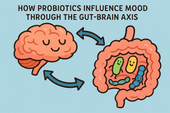
How Probiotics Influence Mood Through the Gut-Brain Axis
Discover how probiotics can do more than support your digestion—they can actually uplift your mood. This article explores the fascinating gut-brain axis and how balancing your gut bacteria through probiotics may help reduce anxiety, improve emotional stability, and support long-term mental well-being. 🌿🧠
-
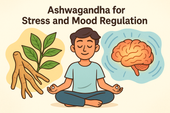
Ashwagandha for Stress and Mood Regulation
Discover how Ashwagandha, the powerful adaptogenic herb 🌿, helps your body manage stress and regulate mood. Learn how it balances cortisol, boosts GABA and serotonin, and supports emotional stability — helping you feel calm, focused, and resilient every day.
-
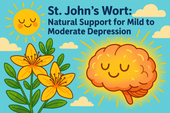
St. John’s Wort: Natural Support for Mild to Moderate Depression
Discover how St. John’s Wort, the “sunshine herb” 🌼, naturally supports mild to moderate depression. Learn how it boosts serotonin, balances mood, and promotes emotional resilience — with research showing its effectiveness compares to antidepressants, but with fewer side effects.
-
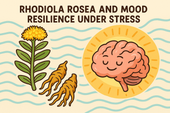
Rhodiola Rosea and Mood Resilience Under Stress
Discover how Rhodiola rosea helps your body adapt to stress 🌿. Learn how this powerful adaptogen balances cortisol, supports serotonin and dopamine, and strengthens emotional resilience — helping you stay calm, focused, and energized under pressure.
-
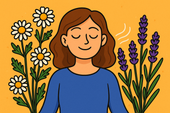
Chamomile and Lavender: Herbal Calm for Emotional Fluctuations
Discover how chamomile and lavender bring calm to emotional ups and downs 🌿. Learn how these two soothing herbs balance your nervous system, ease anxiety, and support restful sleep — naturally helping you find peace and emotional stability.
-
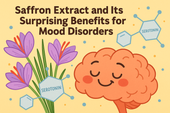
Saffron Extract and Its Surprising Benefits for Mood Disorders
Discover how saffron extract — the golden spice of joy 🌸 — can naturally support mood balance, ease anxiety, and lift mild depression. Learn what science says about its serotonin-boosting power, the ideal dosage, and how this ancient remedy compares to modern antidepressants.
-
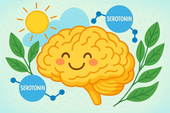
5-HTP and Serotonin: A Natural Path to Lifting Mood
Discover how 5-HTP naturally boosts serotonin 🌞 — the neurotransmitter behind mood, sleep, and emotional balance. Learn how this plant-derived compound supports happiness, reduces anxiety, and improves rest by helping your brain create more serotonin the gentle, natural way.
-
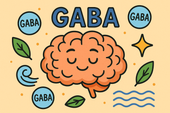
GABA Supplements for Reducing Anxiety and Mood Swings
Discover how GABA supplements can help reduce anxiety and balance mood naturally 🌿. Learn how this calming neurotransmitter works to quiet the mind, ease stress, and improve sleep — plus which nutrients and habits can boost your body’s own GABA production for long-term emotional stability.
-
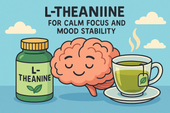
L-Theanine for Calm Focus and Mood Stability
Discover how L-theanine, the calming compound found in green tea 🍵, promotes focus, relaxation, and mood stability. Learn the science behind how it balances neurotransmitters, reduces stress hormones, and enhances clarity — helping you stay centered, calm, and productive without sedation.
-
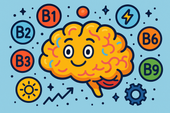
B Vitamins and Brain Chemistry: Supporting Energy and Emotional Balance
Discover how B vitamins power your brain chemistry ⚡. Learn how B6, B9, and B12 support serotonin, dopamine, and energy production — helping boost focus, mood, and emotional balance. From diet to supplements, explore how this vital nutrient group keeps your mind resilient and your energy steady.
-

N-Acetyl Cysteine (NAC) and Mood Disorders: What the Research Says
Learn how N-Acetyl Cysteine (NAC) supports brain health and mood balance 🧠. Discover how this antioxidant helps reduce oxidative stress, regulate glutamate, and improve emotional stability in depression, bipolar disorder, and anxiety — backed by cutting-edge psychiatric research.
-

Supplements for Bipolar Disorder: What May Support Stability
Discover the best supplements for bipolar disorder 🌿 that may support emotional stability and brain health. Learn how nutrients like omega-3s, magnesium, vitamin D, and NAC can help reduce inflammation, balance neurotransmitters, and complement traditional treatment safely.

















































